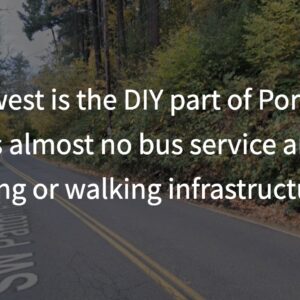Attorney (and BikePortland advertiser) Chris Thomas of the Thomas, Coon, Newton & Frost law firm, shared his expertise on liability in the comments section of our recent post about a case involving Oregon’s recreational immunity law: “In fact, recreational immunity is alive and well,” wrote Thomas.
Thomas reminds readers of the meat-and-potatoes of how civil trials work, and explains what is happening behind the scenes.
Here’s what Thomas had to say:
Thanks Jonathan for your coverage here. This is a complex issue and I want to share a few thoughts and points of clarification.
The plaintiff in this case, Ms. Fields, has not received any compensation for her injuries. Her case is set for trial, and she will lose if a jury decides either 1) she was walking for recreation, not transportation, at the time she fell, or 2) she was more than 50% at fault for causing her injuries.The appeals court in Fields said that a jury, not a judge, should decide whether Ms. Fields was using the trail for recreation (creating immunity) or transportation (no immunity) at the time she fell.
Based on the Fields case, an insurance company for small towns in Oregon, CIS, put a memo out declaring that the court had “effectively ended recreational immunity.” In fact, recreational immunity is alive and well, but CIS wishes that the judges had decided Ms. Fields was recreating at the time she fell and thrown her case out on that basis. In our civil justice system, questions of fact are decided by juries, not judges, which is why the Fields court said the issue should go to the jury. Again, a jury could still decide that Ms. Fields was recreating and she would lose on that basis.
Unfortunately, the CIS narrative that recreational immunity no longer exists has gained traction, causing many small towns to close trails.
Why does Ms. Fields’ purpose in using the trail–transportation or recreation–matter? Imagine she was walking to the beach not to enjoy the scenery, but rather to work at her job as a lifeguard (or picking up trash, or as a park ranger, etc.). If she fell on an extremely slippery bridge on a City-owned path, and that was the only way for her to access her job, shouldn’t she be entitled to bring a case against the City for poor infrastructure? Of course, she could still lose that case if a jury found the City acted reasonably, or that she didn’t walk carefully enough, but should her case be tossed out at the outset because she happened to be walking on a public trail where people often recreate?
An analogy for Portland bicyclists: If I am riding to work on the Springwater corridor, and a City worker accidentally left a big pile of lose gravel on the path, causing me to crash and sustain injuries, should I not be allowed to sue the City because I was on a path commonly used for recreation? Again, if a jury later found that I rode for recreation, or that I wasn’t riding carefully enough, I could still lose for either of those reasons.
I agree that private landowners who open their property up to the public for recreational use should not have to worry about being sued. But there are many public facilities, like the Springwater corridor, where I think it is good for the City to have an incentive to keep them safe, as they are not only used for recreation but are also an important part of our transportation network. And I worry that the reaction to Fields case will be to say there is immunity on any “recreational” facility, regardless of why or how it was being used, which could have unintended consequences that uniquely affect vulnerable users.
Thank you Chris Thomas! This is the first of several comments Chris wrote, he also responded to a couple of other commenters. We’re so grateful to have subject-matter experts contributing to our comment section. Read the whole thread here.








Thanks for reading.
BikePortland has served this community with independent community journalism since 2005. We rely on subscriptions from readers like you to survive. Your financial support is vital in keeping this valuable resource alive and well.
Please subscribe today to strengthen and expand our work.
Thank you for highlighting this comment Lisa. One the great parts of this community is we have thoughtful dialogue and back and forth. It’s what makes BP such a special place and your job to help keep it that way is not always applauded 🙂
Appreciate this weekly column for adding nuance to topics covered.
The problem is that there is no way to predict whether a recreational trail will be used by someone for some other purpose. So the owner is liable based on something they have no control over and no advance knowledge of. Its not at all clear to me why someone riding to work should be compensated while someone riding for recreation shouldn’t be. I am not even sure the two things are really separate, there are a lot of people who choose to who ride to work in part as a form of recreation.
Trying to understand it myself. I think the intention is, since we live in a society that coerces most people to take jobs even when they don’t like it, or it’s too far away, etc, it would be more unethical to require people to take dangerous routes to that job. I.e. people have to work, we should make it safe for them to get there. Recreation is “optional” (it actually isn’t, but I think that’s the reasoning), and also some people don’t want perfectly smooth safe recreational trails, they want some roots crossing the trail, some rocks, or in this case a rustic bridge, to help them feel like they’re out in nature (for example). So they have different standards.
Like, if you’re driving – and by the same token, cycling on a path – to work and there is some big hump in the road that causes you to crash, that’s unacceptable. The same way it’s unacceptable (in my opinion) that they don’t plow the bike lanes when it snows (where possible). And the way you work out how unacceptable something is is with lawsuits.
But I completely agree that it’s actually impossible to separate these things and it’s farcical to try. People go on drives for recreation, yet they still expect the same standards. There should be no legal concept of “recreational” transportation, there should be paths that are maintained at some guaranteed standard. A nature trail with gravel and dirt should have no legal liability if it is designated as such. I don’t know, maybe that’s where the legal grey areas would still be. What path/road/trail is designated for what? But that shouldn’t be too hard and isn’t as meaningless as “recreational”.
I am not going to say the specific one that I am thinking of, but this comment makes me wonder if a popular privately owned safe route alternative in SW portland might soon be sporting signs saying recreational riding only, absolutely no transportation cycling allowed…